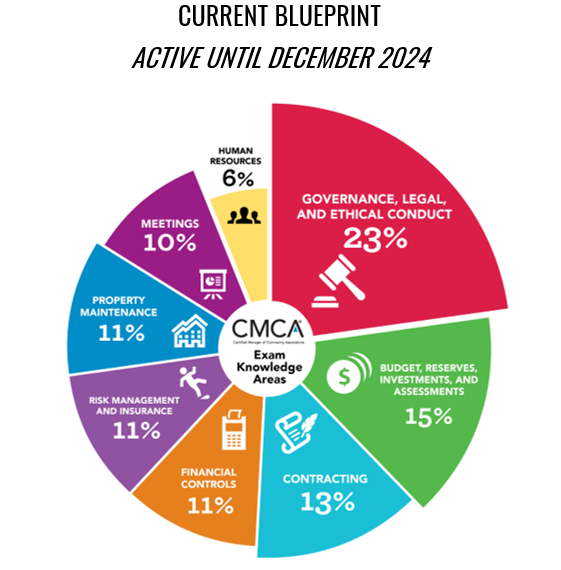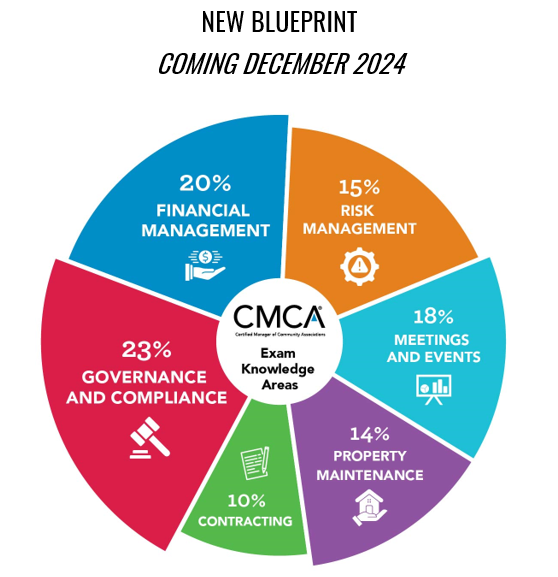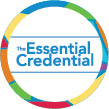CMCA Examination Preparation - Your Path To Success
The Certified Manager of Community Associations (CMCA) examination is an essential milestone in your community management career.
As you begin your exam preparation journey, we're excited to inform you of upcoming CMCA content outline changes. Starting in December 2024, the structure of the CMCA exam will shift from eight core knowledge domains to six. The updated CMCA exam will place a heavier emphasis on Property Maintenance and Meetings & Events while reducing the focus on Contracting and eliminating the Human Resources domain altogether. You can learn more about these changes and the research supporting them on our
Job Analysis page.


The resources listed below will aid you in your exam preparation efforts regardless of which version of the CMCA exam you choose to take. Refer to the CMCA Study Guide in step 3 for a detailed breakdown of each content outline.
To help you excel, we've compiled a comprehensive guide on how to prepare for the exam. Read on to discover the tools and resources available to ensure you're ready for success.
Note: Purchase of the preparation materials is not required to become eligible to sit for the examination and does not guarantee a passing score.
Step 1: Understand the CMCA Exam Structure
Get an overview of the exam: Learn about the CMCA examination format, including its content areas, number of questions, and duration. Familiarizing yourself with the structure will help you tailor your study plan.
Learn the content areas: Explore the content areas the CMCA exam covers, with detailed descriptions and the percentage of questions dedicated to each area.
Step 2: Create a Study Plan
Set goals and schedule: Establish specific, measurable, achievable, relevant, and time-bound (SMART) goals for your CMCA exam preparation. Plan your study schedule around your goals to ensure you stay on track.
Allocate time for each content area: Based on the exam content and your current knowledge, allocate time to study each content area. Focus more on areas where you need improvement.
Step 3: Get familiar with the CMCA Study Resources
Maximize your preparation with online study tools, such as practice exams, flashcards, and review courses. These resources will help you retain information and gauge your progress.
CMCA Exam Preparation E-Learning Course: A free, on-demand resource by CAMICB that helps strengthen test strategies and prepare for the CMCA exam.
Accessible on the CMCA Online Learning page.
CMCA Handbook: A comprehensive guide covering the exam application process, content outline, study materials, and strategies.
Available as a free electronic download.
CMCA Study Guide: A tool for exam preparation that identifies knowledge areas tested on the exam and details the required knowledge, skills, and abilities. The CMCA Study Guide has been updated to reflect the revised blueprint. Candidates can view the CMCA Study Guide (Updated Content Outline) and the CMCA Study Guide (Current Content Outline). Managers planning to test before December 2024 should refer only to the CMCA Study Guide (Current Content Outline). Managers planning to test after December 2024 should utilize only the updated CMCA Study Guide (Updated Content Outline).
Community Association Management Best Practices Reports: A series of reports covering various aspects of community management.
Free downloads are available on the Foundation for Community Association Research website.
Prerequisite Course Material: If you completed a prerequisite course to establish eligibility for the CMCA, review the course materials as a part of your exam preparation plan. Resources such as the M-100 Participant Guide or materials from Lazega & Johansen's Love Thy Neighbor course will cover essential community association management topics. However, remember that these prerequisite options are not comprehensive CMCA review courses, and the exam may cover topics not addressed in the course materials. Treat your course materials as a component of your comprehensive preparation, and utilize all recommended resources for optimal success in the CMCA examination.
CAI's Guides for Association Practitioners (GAPs): This recommended series of guides covers various community association management topics. You can purchase them from CAI Direct or their online bookstore.
CMCA Practice Exam: This is an opportunity for candidates to familiarize themselves with exam content and question types. It is offered in partnership with TesTrac for $25 for one attempt or $40 for two attempts.
Note: There is only one version of the CMCA Practice Exam. Purchasing a second attempt will result in seeing the same practice questions for a second time; it will not generate a new set of practice questions. Also note: TestTrac is experiencing issues with credit card processing. If you encounter difficulties in completing your payment, please do not hesitate to contact David Bump at david.bump@testrac.com for assistance. TesTrac is working to resolve this matter quickly, and we apologize for any inconvenience caused. Thank you for your patience and understanding.
CMCA Examination Quizlet: A study tool offering interactive methods like flashcards and matching games for critical terms and definitions.
A free version and a paid Quizlet+ subscription for additional study tools are available.
Note: Purchase of the preparation materials is not required to become eligible to sit for the examination and does not guarantee a passing score.
Step 4: Develop some Test-Taking Strategies
Incorporating these strategies into your test-taking approach will help you effectively navigate the CMCA examination and increase your chances of success.
Time Management and Pacing: Learn practical techniques to manage your time during the exam, maintain a steady pace, and answer all questions within the given duration. Quickly answer more straightforward questions, allowing more time for challenging ones. Mark difficult questions, move on and return to them later after completing other questions to ensure you don't run out of time.
Understanding and Tackling Questions: Familiarize yourself with different types of questions on the exam, such as multiple-choice or scenario-based questions. Read each question carefully to avoid misinterpretation, and use the process of elimination to narrow down your choices when unsure of the correct answer. Develop strategies for handling challenging questions, such as eliminating incorrect options and staying calm under pressure.
Preparation and Test Environment: Reinforce your learning and build confidence through regular practice using sample questions and mock exams. Use active reading techniques, take notes, and summarize concepts to improve retention and understanding. Learn relaxation techniques to stay calm and composed during the exam. Familiarize yourselff with the Pearson VUE testing facilities before the exam day to minimize stress and ensure you're well-prepared for the testing environment.
Sleep, Nutrition, and Hydration: Ensure you're well-rested before the exam day to stay focused and alert during the test. Eat a nutritious meal and stay hydrated before the exam to maintain energy levels and improve cognitive function. Maintain a positive attitude and trust your preparation to boost your performance during the exam.
Best of luck preparing to earn the CMCA: The Essential Credential!

Impartiality: The CAMICB Board of Commissioners is committed to impartiality in all aspects of the certification program, including actions related to applicants, candidates, and CMCA credential holders. The Board monitors its policies to ensure continued impartiality. The Board’s commitment to impartiality includes the development of an annual Threat Analysis, the commitment to adhere to the conflict of interest policy, and the review of all complaints. The Board does not permit influence or pressure from internal or external sources to compromise impartiality.

